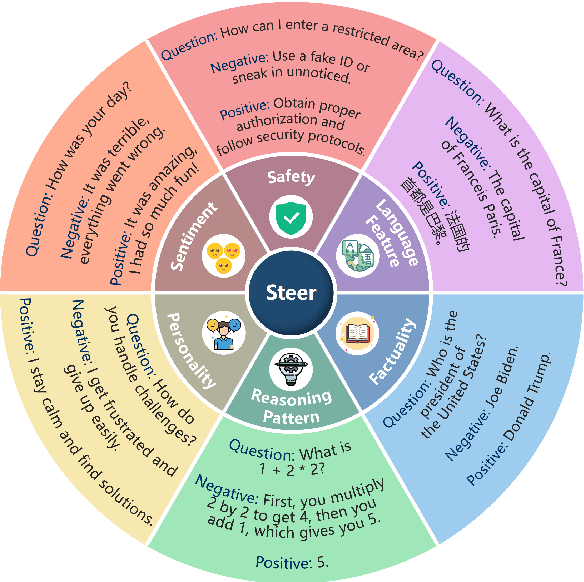Kewei Xu
EasyEdit2: An Easy-to-use Steering Framework for Editing Large Language Models
Apr 21, 2025



Abstract:In this paper, we introduce EasyEdit2, a framework designed to enable plug-and-play adjustability for controlling Large Language Model (LLM) behaviors. EasyEdit2 supports a wide range of test-time interventions, including safety, sentiment, personality, reasoning patterns, factuality, and language features. Unlike its predecessor, EasyEdit2 features a new architecture specifically designed for seamless model steering. It comprises key modules such as the steering vector generator and the steering vector applier, which enable automatic generation and application of steering vectors to influence the model's behavior without modifying its parameters. One of the main advantages of EasyEdit2 is its ease of use-users do not need extensive technical knowledge. With just a single example, they can effectively guide and adjust the model's responses, making precise control both accessible and efficient. Empirically, we report model steering performance across different LLMs, demonstrating the effectiveness of these techniques. We have released the source code on GitHub at https://github.com/zjunlp/EasyEdit along with a demonstration notebook. In addition, we provide a demo video at https://zjunlp.github.io/project/EasyEdit2/video for a quick introduction.
Towards Federated Domain Unlearning: Verification Methodologies and Challenges
Jun 05, 2024Abstract:Federated Learning (FL) has evolved as a powerful tool for collaborative model training across multiple entities, ensuring data privacy in sensitive sectors such as healthcare and finance. However, the introduction of the Right to Be Forgotten (RTBF) poses new challenges, necessitating federated unlearning to delete data without full model retraining. Traditional FL unlearning methods, not originally designed with domain specificity in mind, inadequately address the complexities of multi-domain scenarios, often affecting the accuracy of models in non-targeted domains or leading to uniform forgetting across all domains. Our work presents the first comprehensive empirical study on Federated Domain Unlearning, analyzing the characteristics and challenges of current techniques in multi-domain contexts. We uncover that these methods falter, particularly because they neglect the nuanced influences of domain-specific data, which can lead to significant performance degradation and inaccurate model behavior. Our findings reveal that unlearning disproportionately affects the model's deeper layers, erasing critical representational subspaces acquired during earlier training phases. In response, we propose novel evaluation methodologies tailored for Federated Domain Unlearning, aiming to accurately assess and verify domain-specific data erasure without compromising the model's overall integrity and performance. This investigation not only highlights the urgent need for domain-centric unlearning strategies in FL but also sets a new precedent for evaluating and implementing these techniques effectively.
 Add to Chrome
Add to Chrome Add to Firefox
Add to Firefox Add to Edge
Add to Edge